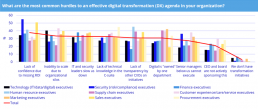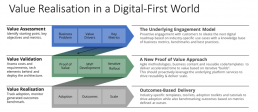Digital transformation will account for more than half of IT investment by 2024, according to IDC research. How are you working to ensure that this investment is worthwhile?
The past few years have seen an endless stream of digital transformation projects as organisations first started to realise they needed to take advantage of new business models (as per last month’s blog about the challenge of driving 40% of revenues from digital), then the change-or-die moment when COVID-19 forced so many people to work from home. In fact, the motivations for both of these types of project were existential — the remote work requirement was immediate, but adapting business models to the 21st century is essential, if less critical in timescale.
What are the Blockers?
This recent IDC survey shows the blockers to effective digital transformation in enterprises.
We can see that no matter who responds, the picture is relatively consistent — there are transformation initiatives, and CEO/board sponsorship is not the biggest problem. Two big issues are a lack of clear ROI, leading to a loss of confidence, and inability to scale because of organisational silos. When we look at CEO responses, we find that confidence in ROI is higher, but frustration is evident with what are seen as slow-moving IT teams and a lack of overall digital competence in the C-suite.
We can infer from this that CEOs are more understanding of the need to transform than those who are transformed and that communication about the need for change and the vision for what the future looks like are potentially missing in many cases. For those who have ever studied organisational change management, this will not be big news. We have seen many surveys down the years that show that when change programmes fail to achieve their goals, it is often down to employee resistance and lack of support from middle management. When the vision and the ROI for the project are not understood, it is understandable that those whose livelihoods depend on the short-term future of their employer are unwilling to gamble their immediate welfare against some longer-term objective.
Is it Possible to Guarantee ROI?
So, can we guarantee ROI from digital transformation? I challenge anyone to guarantee anything in the highly dynamic business environment we find ourselves in today, with healthcare and geopolitics competing with climate change and energy security for space in our strategic plans. However, I do think there are things we can do to shift the dial and make it far more likely that we get a faster return on our transformation investments, and that we can measure these in a way that reinforces confidence across our organisations. This is an example from the IDC analysts that takes an iterative approach to the problem.
This approach from our Digital Transformation practice is a good example of how we can plan and implement transformation activities while keeping an eye on the value realisation. For most of us, it’s naïve to think that our digital transformation is going to reinvent our industry. The path has been set for us by early adopters and start-ups, and our job is to pick the digital use cases that are most appropriate to our business, understand what best practice looks like in our case, and benchmark against known success. Of course, we will deliver something that is particular to our business, and it will be built on the knowledge and experience that gives our own organisation its value proposition. But our roadmap should be built on well-understood technological foundations with established metrics.
The second phase is to prove the case, through modelling and MVP/proof of concepts. This only works well when the whole organisation is involved, from finance, which must learn how to adjust budget models to support these new ways of working, through the operational staff whose day-to-day experience will be changed, to the IT teams that deliver and support these processes.
As we move to the third phase, adoption and scale are the focus, using the metrics that we defined at the start of the process and refined in the validation stage. Using an approach like this keeps ROI in mind throughout the project, giving confidence to those who will be delivering against the plan, and binding everyone to the successful outcome.
Communication is Key
Alongside all this, our communication must be regular, appropriate and two-way. There are many in our organisations who use the deadly phrase “this is how we’ve always done it”, and they will have (in many cases, well-justified) fears about the latest big idea. In my experience, these voices must be heard, for the temptation to roll over any doubt in pursuit of speed leads to ever-increasing friction as the project progresses. Absolutely no digital transformation project goes smoothly from start to finish, and when the inevitable problems come along, low confidence can turn a pothole into a project-killing chasm.
This and other ideas about guaranteeing ROI from Digital Transformation will be the subject of our Digital Leadership Community Think Tank on March 31. I look forward to the discussion and hope you’ll be able to join us. If you haven’t received an invitation, please contact me, cweston@idc.com, or Marc, mdowd@idc.com, to join our invitation-only community, which is free for digital leaders across Europe.




